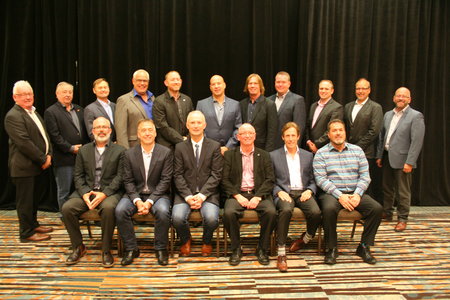
| PAST ISSUES | SEND TO A FRIEND | ADVERTISE WITH US | MCAC WEBSITE | |
| September 26, 2018 | |
|
Member Update
WHISTLER, September 21, 2018 – The Mechanical Contractors Association of Canada (MCAC) today elected Jack Bavis of The Cahill Group as its new president and board chairman for its 2018/2019 MCAC Board of Directors. He is preceded by Dave Flamand of Peak Mechanical Services. MCAC is pleased to announce the members of our Board of Directors for 2018–19.
Front row (L to R) are the members of the MCAC Executive Committee: Derek Ermen, Wayne Davidson, Dave Flamand, Jack Bavis, MCAC CEO Pierre Boucher, Dave Holek Back row (L to R): Charlie Webb, Dale Miller, John Warnica, Luc Kadziolka, Mike Miller, Brad Mason, Scott Kerr, Joe Givens, Ian Arbuckle, Serge Robert, Charles Savoie INDUSTRY NEWS
LEADERSHIP, EDUCATION & TRAINING
The latest edition of CEC's acclaimed Estimating Conference is scheduled for October 17 to 19 in Toronto. Have you registered? The conference focuses on project procurement and strategies. Sessions covered will include deal breakers, project risk and go/no-go strategies, putting together a proposal, and what a general contractor looks for in its selection process — to name a few. Jack Wilhelmi and Tim Wentz from MCA America will lead the conference; Dan Leduc from Norton Rose Fulbright will deliver a special session of his own. Registration is limited. Act now! More than 1,000 students have completed the 10-day PM CEC/University of Waterloo course since its inception in 2000. This latest session is sure to be another sellout. If you have new hires or people looking to upgrade or refresh their PM skills, this is the course for them! As a bonus, the program is Gold Seal-accredited for those who wish to pursue their certification. The Construction Education Council’s latest webinar series, Get Your Ducks in a Row, teaches the basics of adopting and managing information technology assets. Studies show that more than half of corporate IT projects fall short of expectations. Using IT effectively to increase efficiency and boost productivity is an art. This free, five-part series gives participants insights into trends and traps facing companies as they design and deploy IT solutions. INNOVATION & TECHNOLOGY
The rise of “infratech” isn’t the stuff of the future. “It’s already happening and it will accelerate in the next 10 years,” said David Bowcott, global director of Growth, Innovation and Insight for Aon’s Global Construction and Infrastructure Group. The construction industry is, without doubt, a very hands-on and physical profession. It’s understandable then that the sector hasn’t been as quickly changed by the digital age as some other industries. But it looks like the world of construction has become far bolder in its approach and acceptance of technology in the workplace, particularly when it comes to artificial intelligence. BY THE NUMBERS
1580: Sir Francis Drake returns to Plymouth, England, aboard the Golden Hind, after a 33-month voyage to circumnavigate the globe. |

